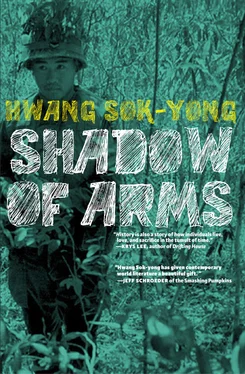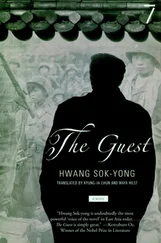The only variation was that every now and then Major Pham would call him out to the Sports Club or to a bar and hand him some extra pocket money. For a while on each payday he had been getting an extra envelope containing thirty thousand piasters. The first time he received one of those envelopes, it had made his heart pound. The sum was nearly three times his regular salary, and he almost wept. It had enabled Kiem to move his family from Dong Dao to a rented house in a safer and more pleasant neighborhood on Puohung Street.
Still, it was not a question of money. What he could not bear was that he, the chief assistant to Major Pham, knew almost nothing about the phoenix hamlets resettlement program, the most important mission being undertaken by the aide-de-camp’s office. Kiem was not a graduate from the military academy; he had just taken the officer appointment exam when they drafted him in Quang Ngai, where he had been working as a kindergarten teacher. He was an ordinary conscript officer. But he was no idiot; he knew better than to assume that Pham Quyen was walking all over him and failing to delegate him any tasks because he was single-mindedly absorbed in his mission. When he had received his promotion to the provincial government office from his prior duty as platoon leader of a supply company on the outskirts of Hoi An, his fellow officers had agreed that, “In three years, you’ll be out of this hell for good.” And some civilians had told him, “When you get there, save up some money and find a way to move into a police detachment.”
Such had been the conventional wisdom among his fellow officers. A certain colonel was said to have refused a promotion to general and instead went daily to visit a powerbroker he knew, begging the man to appoint him as a police superintendent. That Kiem had been chosen for the provincial office duty was due to his outstanding record in the administrative training course at officer school. Kiem slowly took his feet off the desk. He poured some coffee that had been brought in from the Grand Hotel, the quality of which Major Pham was always complaining about, and drank it cold.
There was no need for him to hurry over to the warehouse just because some transports were on the way. Besides, there was nothing for him to supervise over there, either. All he had to do was mechanically collect the invoices and receipts. The engines of the trucks were noisy enough for him to hear as they rolled in and he could then leisurely stroll downstairs to the warehouse. Just then the telephone rang. Instinctively, Kiem sprang up from the chair, snapped to attention like a good soldier, and picked up the receiver.
“Office of the aide-de-camp!”
“Is Major Pham in?” asked the voice on the line.
“Ah, he’s out of the office for the day. Who’s calling, please?”
“This is his younger brother. You’re Lieutenant Kiem, aren’t you?”
“That’s right. The chief has accompanied His Excellency, the Provincial Governor, to an important conference. Would you like to leave a message?”
“No, thank you. Are you, Lieutenant, by any chance free after work today?”
“I’m afraid I’ll have an hour’s extra duty this afternoon. Why?”
“Well, I was just wondering if I could ask you a favor.”
“What is it?”
“At seven o’clock, you know the Guangzhou Restaurant next to the Hotel Thanh Thanh, don’t you?”
“The Chinese place?”
“Yes. I’ll be waiting there.”
Kiem was about to say something more when the phone clicked off. What could it be about? Kiem didn’t have the faintest idea. As for Major Pham’s younger brother, he had once had tea with him when he took the Land Rover to deliver a month’s worth of rice to the major’s family, but they had not had a real chance to talk. The major always exuded pride when he mentioned how his younger brother had studied medicine at Hue University and was now carrying out his military service obligation. But Kiem had sensed that this brother had bought his way out of military duty and had been idling around the house and occasionally playing the role of agent for his brother in conducting business deals. Upon further thought, however, it occurred to Kiem that it could not do him any harm to be on better terms with the younger brother of his immediate superior. In fact, he was the one Kiem ought to have gone out of his way to contact in order to make a favorable impression.
At seven twenty that evening, Kiem strolled into Guangzhou Restaurant. Through the picture window across from the door he could see the beach and the narrow sea running to meet the Thu Bon River. The glow of the setting sun fell on the far side of the harbor, and the masts of a junk sailing by shone a pale red in the fading light. The window was open and a glass wind chime was clinking. Each table was enclosed by a wicker screen. A waiter approached.
“How many people, sir?”
“I’m here to meet someone. I’m Lieutenant Kiem.”
“I see, this way please, Lieutenant.”
Pham Minh was waiting in a corner room off of a crescent-shaped corridor. He had been drinking jasmine tea and rose from his seat as Kiem entered.
“Some things came up, so I’m a little late.”
Kiem spoke in a formal, polite tone. Minh smiled and answered, “I just arrived myself a few minutes ago.” He added, “Now, what would you like?” just as Kiem asked, “What would you like to have?”
The two men awkwardly laughed. They ordered a set dinner and some bamboo shoot wine.
“I’ve heard a lot about you from my brother. I understand you’re from Quang Ngai?”
“Yes, but I moved my parents and younger brothers and sisters to Da Nang.”
“Sounds like you have a big family to support. Married?”
“No, not yet.”
While eating, they went on exchanging small talk. Kiem was anxious to find out what sort of favor the major’s brother was going to ask, and why he was the one who had been approached, but Pham Minh had not yet come to the heart of the matter.
“What do you say, Lieutenant? Do you suppose we’ll be winning this war?”
Kiem was momentarily at a loss. “Well, isn’t the world’s greatest power helping us now? The combat strength of the North and the NLF has almost been used up. The bombing of the North will go on. Perhaps the communists will try to negotiate.”
Kiem talked about the war in the stereotypical terms commonly used in pro-government newspapers or propaganda reports from the ARVN. Pham Minh nodded. “I wouldn’t know for sure. Do you think this war is simply between the North Vietnamese Army and the government in Saigon? At the beginning the war was against the French colonialists, and now isn’t America taking over the place of the French?”
“The reality today no longer permits us to argue about nationalism or colonialism. For we now have a government with undeniable sovereignty over South Vietnam.”
As Kiem once again assumed the tone of a government spokesman, Pham Minh abruptly changed both the topic of conversation and the expression on his face.
“Let’s not talk about silly politics. I hate both Saigon and Hanoi. Most of all, I hate America.”
“I don’t like America, either,” Kiem replied.
As he poured more wine into Kiem’s glass, Minh said, as if half-joking, “But dollars I like. Those pretty pieces of paper can turn hell into paradise, anywhere in the world.”
“My sentiment exactly.” Kiem chuckled.
Minh raised his glass. “Now, a toast, to dollars!”
They drank a toast to the one and only point upon which their opinions coincided.
“My brother is an extraordinary man,” Minh said. “He’s a solid pillar in our family and the protector of our household.”
“I too respect the major. He’s a man of great ability. All enterprises in Quang Nam Province are now in his hands.”
Читать дальше












